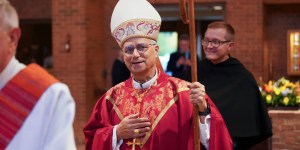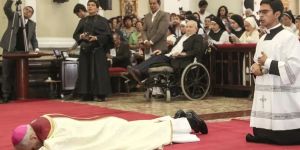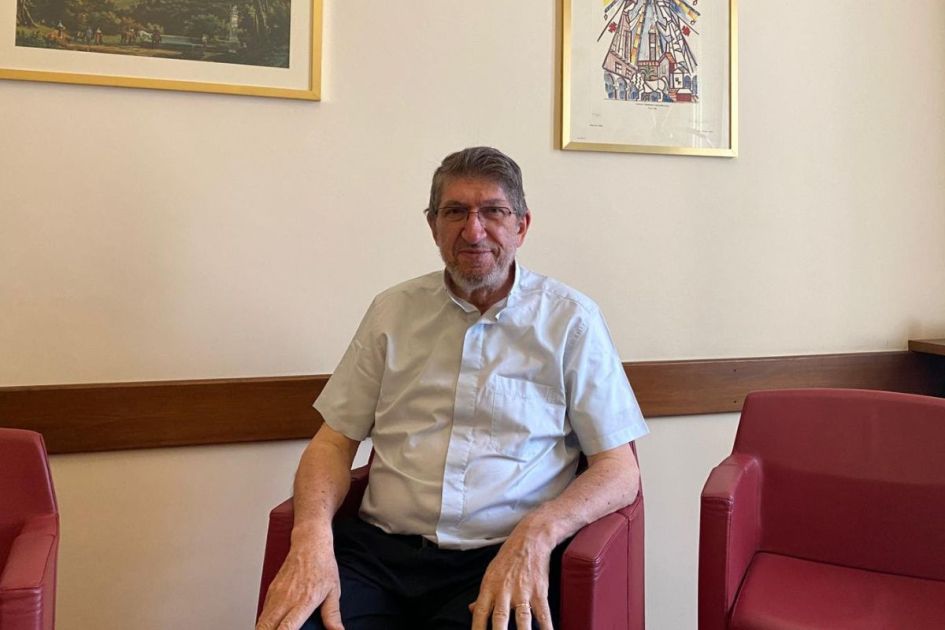This religious congregation was founded in the 13th century and is headquartered a stone’s throw from the Vatican. It has 3,000 members in some 50 countries.
His successor, Spanish priest Alejandro Moral Antón, spoke to I.MEDIA about the mission of the superior, the spirituality of his order, and his long friendship with Robert Francis Prevost.
Born in 1955, the same year as the pope, he says he suggested to Leo XIV that he live with a community of Augustinian friars in the apartment in the Apostolic Palace, where the pope may soon move.
An Agustinian pope
What does it mean today to have a pope from the Augustinian tradition?
Fr. Moral Antón: Augustinian religious follow the Rule of St. Augustine, inspired by the writings of the Bishop of Hippo (354–430). This rule places particular emphasis on brotherhood and communion. Three essential words sum up our spirituality: the search for truth, the practice of charity, and unity.
Augustine also speaks a lot about interiority, affirming that God is “deeper inside me than my own innermost self.” Pope Leo XIV embodies these spiritual dimensions with great force, something the Church greatly needs today.
Respectful and approachable
What is your relationship with Pope Leo XIV, with whom you have worked for several decades?
Fr. Antón: There’s great trust between us and we have a long friendship. In 2001, when he was elected Prior General, he asked me to be his vicar. I served with him and then succeeded him in 2013. Our friendship has continued. Robert is a very respectful person. We can discuss any subject freely and calmly — including soccer! — over a cup of coffee.
As prefect of the Dicastery for Bishops [from 2023 to 2025, editor’s note], he joined our community life here in Rome, at the General Curia. He was always the first to arrive at the chapel at 7:30 a.m. for prayer and Mass. He also often came for lunch — he would arrive a little late, telling us to start without him.
During these moments, he was very approachable. Sometimes he would call me to talk about this or that, and I would contact him to ask his opinion on certain issues. He also asked me, always with great respect, if he could call on the services of a brother from the community to assist him at the dicastery.
Today, of course, things are a little different since he became pope, but I continue to exchange ideas with him regularly.
The role of a prior general
Pope Leo XIV was prior general of your congregation for 12 years. As his successor for the past 10 years, can you describe what this mission entails?
Fr. Antón: The role of the Prior General of the Augustinians is to ensure the unity of the order. Juridically, it’s the provincial priors who govern, but in times of crisis, the Prior General intervenes to maintain cohesion.
He has to visit all the brothers once during his six-year term, either in person or through an assistant or advisor. I myself accompanied Leo XIV when he was prior, for example to Spain and Malta.
The role of prior involves a great deal of travel. In the first few months of this year, I went to India, the Democratic Republic of Congo, and then to Nigeria for almost 40 days. A trip to South Korea was canceled because of the pope’s [Francis’] death.
After Leo XIV was elected, I went to Colombia. Then I returned to Rome for my birthday on June 1 — the Pope came to celebrate with me — and the next day I left for Mexico.
I’m due to travel to Poland in the next few days. A mutual friend, who was his secretary, said to us a few days ago, “I don’t know how you managed to cope with all this traveling.”
You mentioned crisis situations. How do you deal with sensitive cases, particularly complaints of abuse within your congregation?
Fr. Antón: We have a strict process: first, we listen to the victim and encourage them to file a complaint — including a civil complaint — so that we can open an investigation.
Robert Prevost, as Prior General, always took these situations very seriously.
Agustinians at the Vatican
Since the 14th century, the religious of the Order of St. Augustine have also been responsible for the “papal sacristy” in the Vatican. What does that involve? What do they do on a daily basis?
Fr. Antón: Three Augustinian brothers live in a small community in the Vatican and report to the General Curia. They prepare everything for the pope’s liturgical celebrations: all the vestments and other objects needed for the Eucharist.
This “papal sacristy” is located near the Sistine Chapel. Sometimes the current Pope goes to lunch with these religious; I think it’s good for him to be with the community in “normal” and natural moments.
Will Leo XIV participate in community life in the papal apartment where he is soon to move in the Vatican?
Fr. Antón: I told him — out of affection — that it would be good to form a small community of brothers around him who would study, pray, and live with him. Leo XIV could talk with them and go for walks in their company. I don’t know if he’ll form this community, but if he does, I’ll be very happy.
The pope is very alone and bears heavy responsibilities. He has very little time to breathe: when he came here for my birthday, immediately after lunch he had to meet the cyclists of the Giro d’Italia.
He told me recently: “Now I understand what the assistance of the Holy Spirit means: It gives me strength.”
Challenges facing Pope Leo XIV
The Synod on the Future of the Church, a major project begun by Pope Francis, is one of Pope Leo’s great challenges. What insight does Augustinian spirituality bring to this Synod?
Fr. Antón: We Augustinians should be synodal by charism, since our vocation is to seek the truth together. In our order, we say: “The truth is yours, but not all yours; it’s mine, but not all mine; it’s his, but not all his. Together we walk toward the truth.” Our spirit is synodality.
Robert Prevost was formed in this spirit, but that doesn’t mean that he won’t make decisions when necessary. He will inform himself, consult, and seek advice, but in the end he will also know how to decide.
Among the other major cultural challenges of this new pontificate are the conflicts tearing the world apart, and the climate crisis. What can Leo XIV bring to these areas?
Fr. Antón: These are two issues that are dear to him. I had an audience with him on May 16, a week after his election. I brought him various files, including one on a project originally supported by Pope Francis: to propose to all religious groups — Muslims, Jews, Hindus, Taoists, Christians, etc. — that they work together to draft a proposal for world peace. He expressed great interest and will take this issue very seriously.
He’s also very committed to the cause of the environment, which he knows very well since we have a large community in the Amazon region. This issue is very close to his heart and he will undoubtedly champion it during his pontificate.


